Sebastian Vettel: Formula One is ready for an out gay driver
Aston Martin’s four-time F1 World Champion tells Attitude's July/August issue about putting his foot down about anti-gay prejudice as Hungarian PM Viktor Orbán and Saudi Arabia’s King Salman bin Abdulaziz Al Saud watch on.
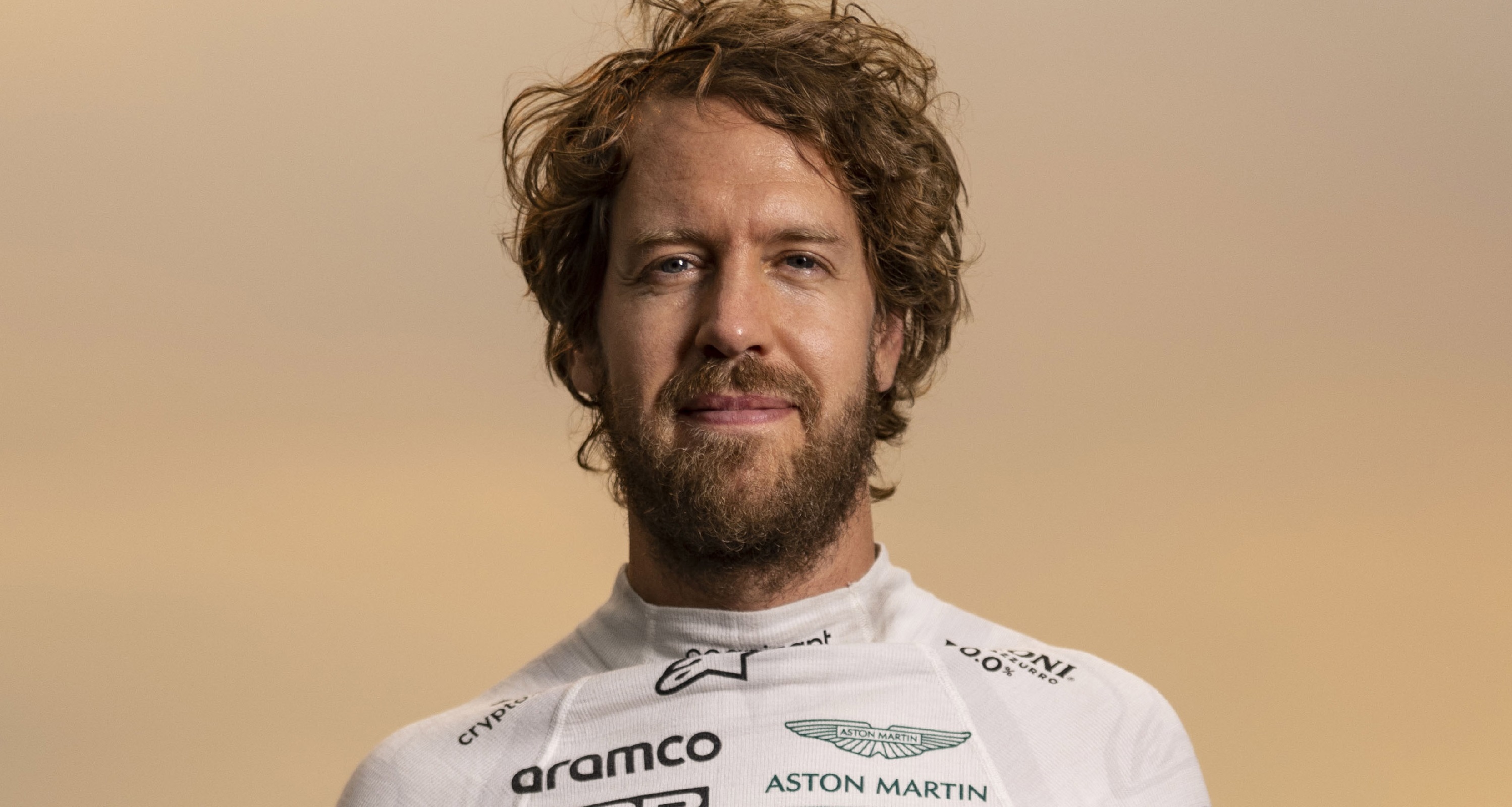
Words: Darren Styles; Photography: Glenn Dunbar
In 30 years of Attitude magazine, many straight allies have graced the front cover, from Prince William and Dame Joan Collins to Robbie Williams and then Prime Minister Tony Blair, with a handful of sportsmen among them — footballer David Beckham, cricketer James Anderson and swimmer Adam Peaty.
But never a Formula One driver. Until now, with Sebastian Vettel. The four-time World Champion is still the youngest man ever to clinch a title (at 23 years and 134 days in 2010) and is currently racing for Aston Martin in motorsport’s premier series.
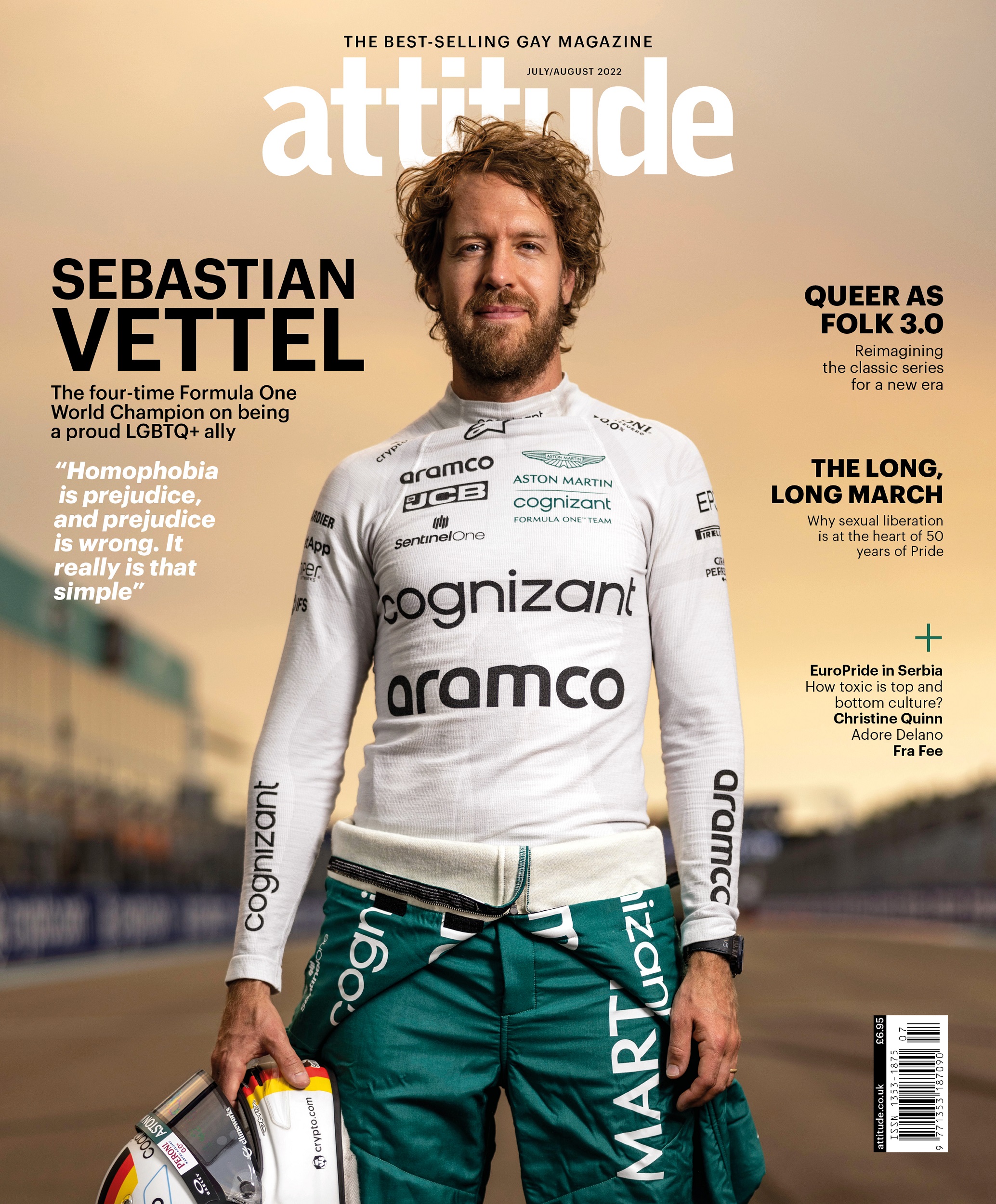
Sebastian Vettel of the cover of the Attitude July/August issue (Photography: Glenn Dunbar)
It’s little surprise it’s taken so long. Since the first World Championship Formula One event, the British Grand Prix in 1950, there have been 771 drivers of 41 different nationalities and yet only three of them have been openly (make that semi- openly) LGBTQ: Nicha Cabral, who raced four World Championship Formula One Grands Prix in the early 60s, lived a closeted life and finally came out as bisexual at 75; 70s and 80s driver Lella Lombardi, one of only two women to have raced in a World Championship Formula One Grand Prix, was a lesbian; and Mike Beuttler, who raced 28 World Championship Formula One Grands Prix in the early 70s, was a gay man.
A reluctance to speak or behave openly in sport is not unique to Formula One. Our national game has only just made a giant leap for progress with Blackpool forward Jake Daniels coming out at the tender age of 17. In doing so, he has become the only other player in the world to share Josh Cavallo’s crown as an out professional footballer. But there are way more footballers than F1 drivers.
You can’t be what you can’t see, and history tells us that the gateway to LGBTQ visibility within any sport so often starts with a straight ally who is prepared to speak out. Step forward Germany’s Sebastian Vettel.
Our story starts last summer, in Hungary, just after the country’s Prime Minister, Viktor Orbán, introduced a new law banning “the portrayal or promotion of homosexuality to anyone under the age of 18”.
Although EU Commission President Ursula von der Leyen described the legislation as a “disgrace” that “uses the protection of children as an excuse to discriminate against people because of their sexual orientation”, it came as little surprise to a community that had seen Orbán previously ban the adoption of children by same-sex couples and pass a law that prevented people from legally changing their gender. Equal marriage, meanwhile, has never existed for Hungarians.
Enter, from stage right, the Formula One circus for a Grand Prix at the Hungaroring, and a tousle-haired German driver intent on making a point.
He arrived for the first practice wearing now-famous Converse hi-tops with a rainbow sweeping up the sides and, amid grumblings from the FIA (F1’s governing body), doubled down for qualifying and race day by wearing a rainbow face mask and matching T-shirt bearing the words ‘same love’.
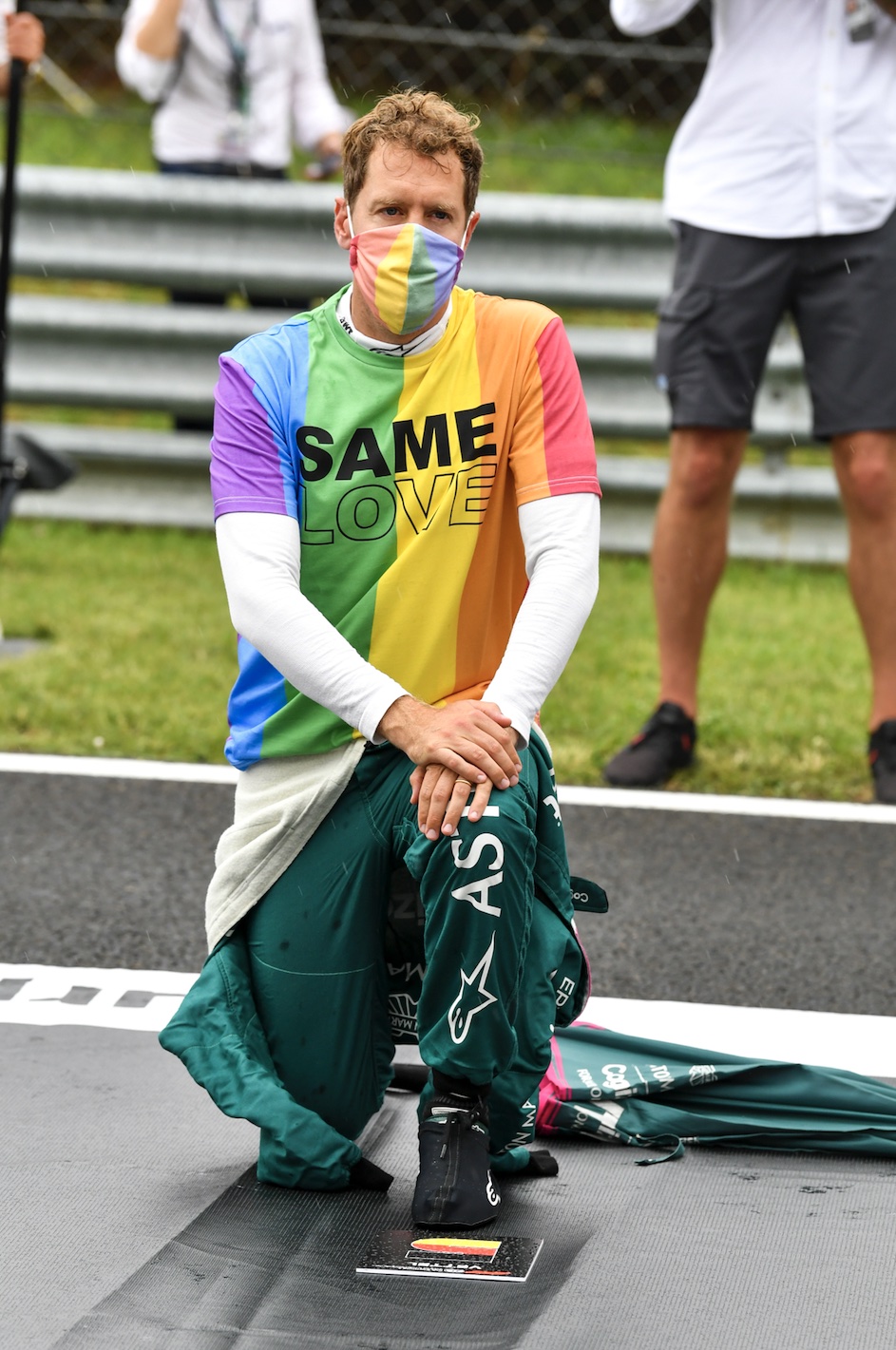
Image: Supplied
“It’s the name of a beautiful song by Macklemore, and I think it explains, in a nice way, some of the wrong perceptions people have,” Vettel said.
“It doesn’t matter your skin colour, it doesn’t matter your background, it doesn’t matter where you come from, it doesn’t matter who you fall in love with. In the end, you just want equal treatment for everybody. Everyone has the same right to love.”
He acknowledged his actions were deliberate, and might be seen by some as provocative, but he was unrepentant: “I find it embarrassing for a country who is in the European Union having some laws like this as part of their [legislation]. I just think we’ve had so many opportunities to learn in the past, and I can’t understand why you are struggling to see that everybody should be free to do what they like, love who they like. It’s along the lines of ‘live and let live.’
“It’s not for us [as Formula One drivers] to make the law, that’s not our role, but I think just to express support for those who are affected by it.”
His high-profile intervention on behalf of Hungary’s LGBTQ community had the desired effect. He led the sports pages over the following days. His hosts were said to be less than impressed.
At the next race he was asked if he was taken aback by the response: “I was surprised it was so much of a big deal,” Vettel said. “Ideally, there wouldn’t be any reaction because it’s just normal. But I wasn’t nervous about or embarrassed by the rainbow colours, or of what people think. I wanted to send a message, and I was very proud to do it.”
So proud that on arrival last December for the Grand Prix in Saudi Arabia — where homosexuality is illegal — he was wearing his rainbow shoes again.

Image: Supplied
“It’s clear that some things aren’t going the way they should [in Saudi Arabia],” said Vettel. “It’s also probably true that things are always taking time and it’s a [work in] progress. I would love to change the world in some things overnight, but who am I to judge about right and wrong? I think that’s a slippery slope. But in some countries, some shortcomings are bigger than others…”
Indeed so, but what to make of this new-found ally, who not only commits to using his platform to speak out, but does so when visiting the very countries that would reject or harm members of the LGBTQ community? And at a point when, through sport, the leaders of said countries are seeking to enjoy their moment in the spotlight. He must make for a most unwelcome house guest.
Hence, for our 2022 Pride issue, we wanted to reach out to the man who’d spoken out for our colours with such distinction. That, in so doing, we’d make Sebastian Vettel the first Formula One driver to grace the cover of a magazine for gay men and the wider LGBTQ community gave us a chance of some face time, we figured. And so, just ahead of the recent Miami Grand Prix, it proved…
You’ve been in Formula One since 2007 — how has the sport’s attitude to diversity and inclusivity changed in that time?
I feel the whole world has changed a lot in that time. There have always been LGBTQ people in Formula One, but I cannot speak for them or say whether they felt they had to hide or not. Certainly, the fact that the wider world has opened up has helped them to come out. So, it’s getting better, and you do now see a few engineers and mechanics who feel able to be more open.
But there’s still more that we can do to improve diversity and inclusivity in motorsport, not only in terms of sexuality but also by supporting and encouraging women, people of colour, those with disabilities and so on. Formula One has started a movement called ‘We race as one’, which is good, but we all have to make a concerted effort to ensure that it actually achieves positive change; so we act on it rather than just talk about it.
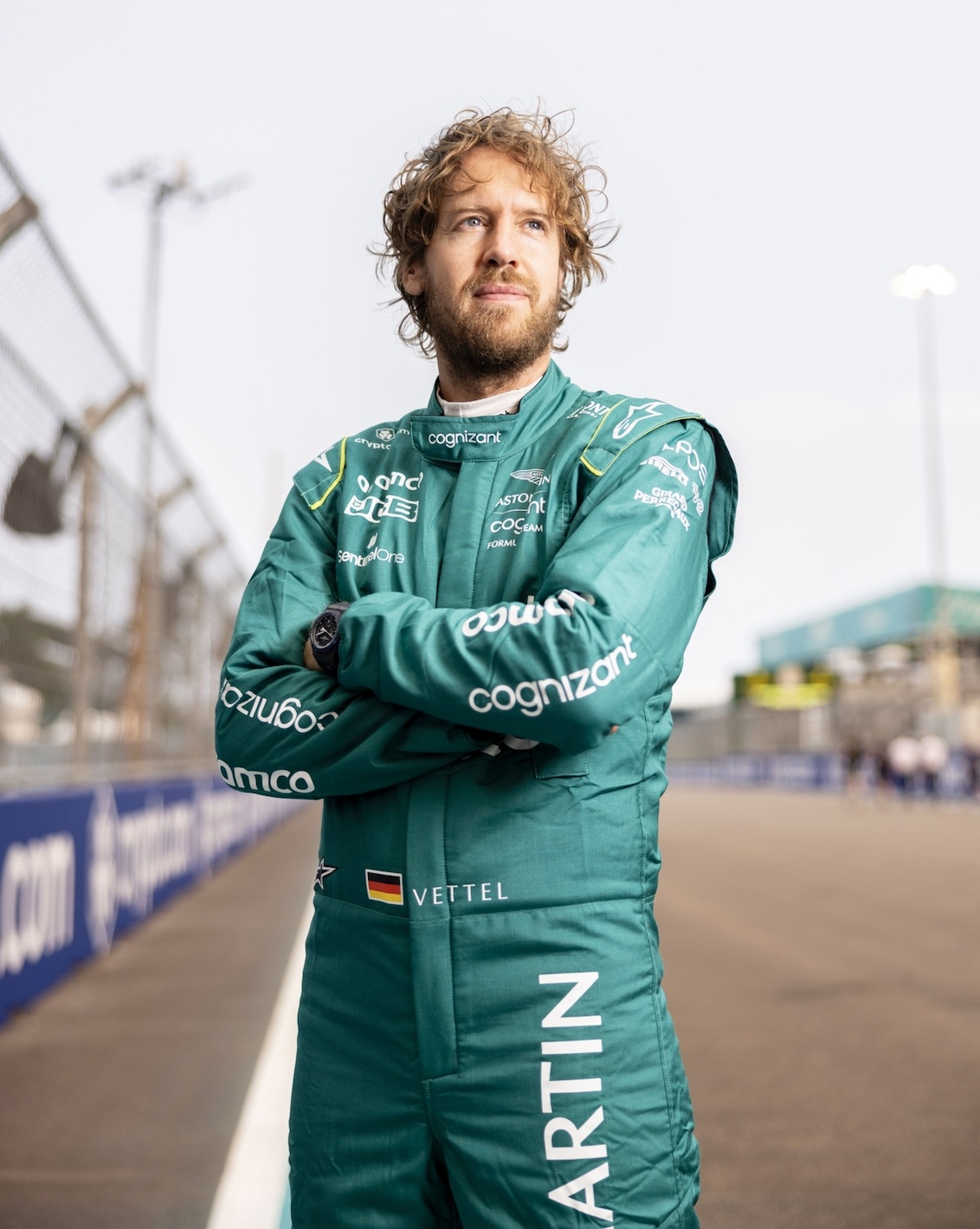
Photography: Glenn Dunbar
Have you witnessed homophobia within the sport?
Not directly — but indirectly I have heard people talking negatively about LGBTQ people and the LGBTQ community. Whenever I heard those things being said in the past it always felt wrong, but today I’m more confident to speak up and shut them down. Homophobia is prejudice, and prejudice is wrong. It really is as simple as that.
Do you feel the 2022 paddock would welcome an openly gay Formula One driver?
Yes, I do. Perhaps that wouldn’t have been the case in the past, but now I think a gay Formula One driver would be welcomed — and rightly so. I feel that a gay driver would help to speed up the elimination of prejudice and help push our sport in a better direction.
Formula One is a very popular sport around the world. It relates to something that a lot of people do every day on a basic level or, even if they don’t drive themselves, they at least come across regularly: driving — or being driven in — a car. Although driving is, in and of itself, dynamic, I regret to say that some members of the driving community, if I can call it that, are nonetheless very slow — static almost — when it comes to progress.
Yet progress is inevitable. Cars have changed and will keep changing — for the better. Indeed, drivers have changed and will keep changing — again for the better. So I do have hope, and therefore I would absolutely welcome a gay Formula One driver. And, as I say, I think and hope our sport would be ready for one.
Are you aware of any Formula One drivers, past or present, who are or were gay but don’t or didn’t want to come out?
No, but I’m pretty sure there must have been some. I guess I wouldn’t know about them because they never came out, which is a shame.
What do you believe are the reasons for a gay Formula One driver to stay in the closet? Colleagues? Rivals? Media? The fans?
I would hope there aren’t any right now, but I guess I’m not the best judge. The reasons might be similar to the situation in a sport like football, for example: the old image of a player or driver as a ‘hero’ who should match a certain set of criteria. But the judging criteria are often just wrong. Who wrote them in the first place? Who got to decide?
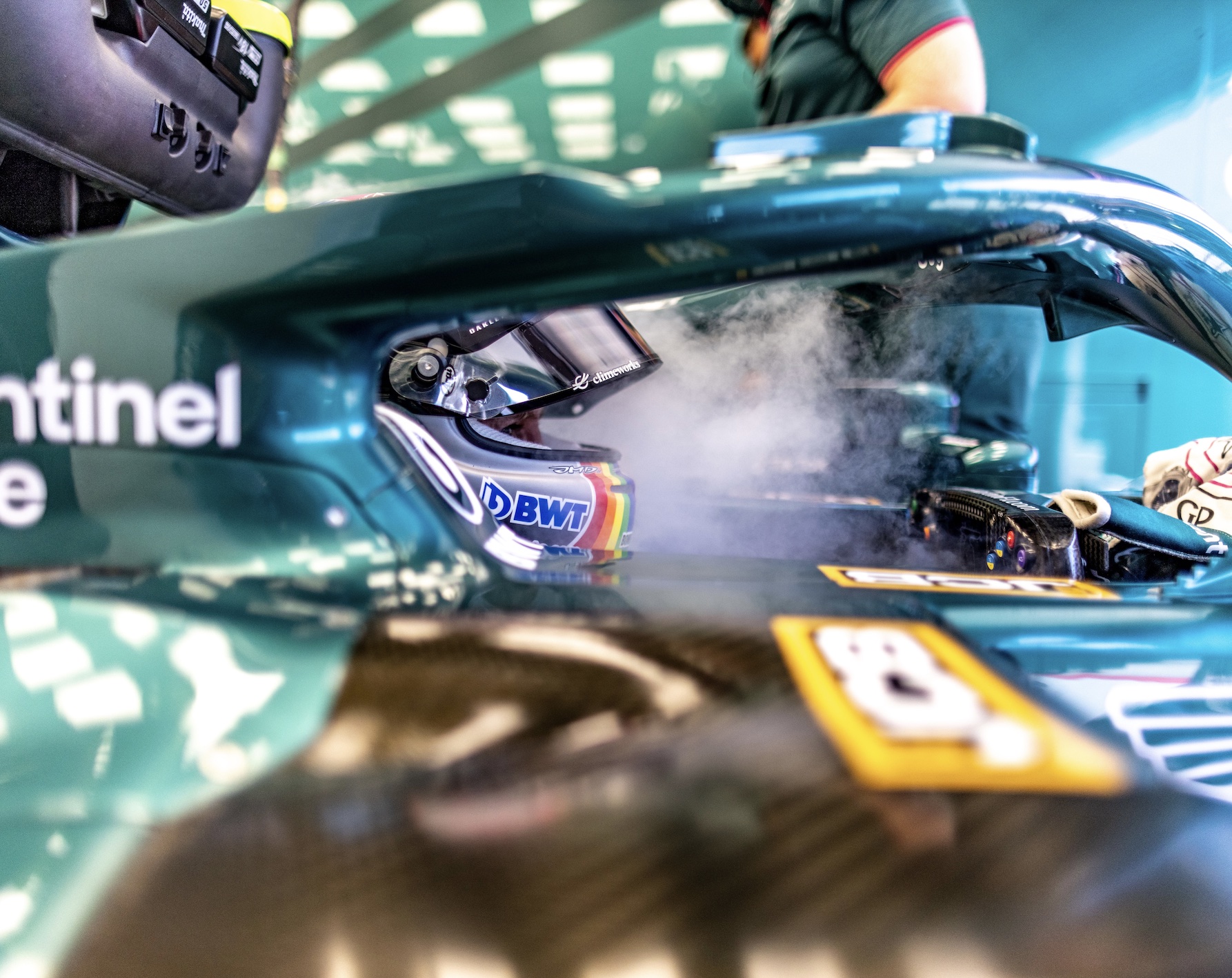
Image: Supplied
For example, ‘men don’t cry’ or ‘don’t show weakness’ — how are those stereotypes in any way related to our performance? Why does our society still shame someone who admits weakness or acknowledges failure? To me, it should be the opposite. It takes enormous courage to show your real self rather than hiding behind a façade based on what people expect. We should start seeing and understanding that it’s the diversity in people that made us evolve and pushed us to new heights.
You were happy to take the knee when Lewis Hamilton sought support for the Black Lives Matter campaign, but a number of other drivers — while forthright in their condemnation of racism — were not. Is that a sign of how difficult it is to carry forward a message in sport, where issues many of us would see as basic human rights are read as politically charged?
All of us have to make our minds up for ourselves. I’m sure that, as I was and I am, the 18 other Formula One drivers were broadly supportive of Lewis’s aims, whether or not they stood or knelt to show that support. What mattered is that we all showed up and were together.
But, yes, I always took the knee, and I usually positioned myself alongside Lewis to do so. He and I see eye-to-eye on a lot of things.
Both you and Lewis Hamilton have spoken out in support of the LGBTQ community — how did you come to be such an ally?
For me, it’s very simple: how can anyone think they have the right to dictate to someone else how they should live or whom they should love? The answer is: they don’t have that right. I’m happy to stand up for that principle.
Are there LGBTQ people who have impacted your life, both personally and professionally?
Not more or less than others, but generally I don’t look at it that way. Whether I like someone or not has nothing to do with their sexual orientation or skin colour. I see everyone as equal. But hearing from people, or reading their stories, and learning about how they dealt with suppression has surely had an impact on me, both consciously and subconsciously.
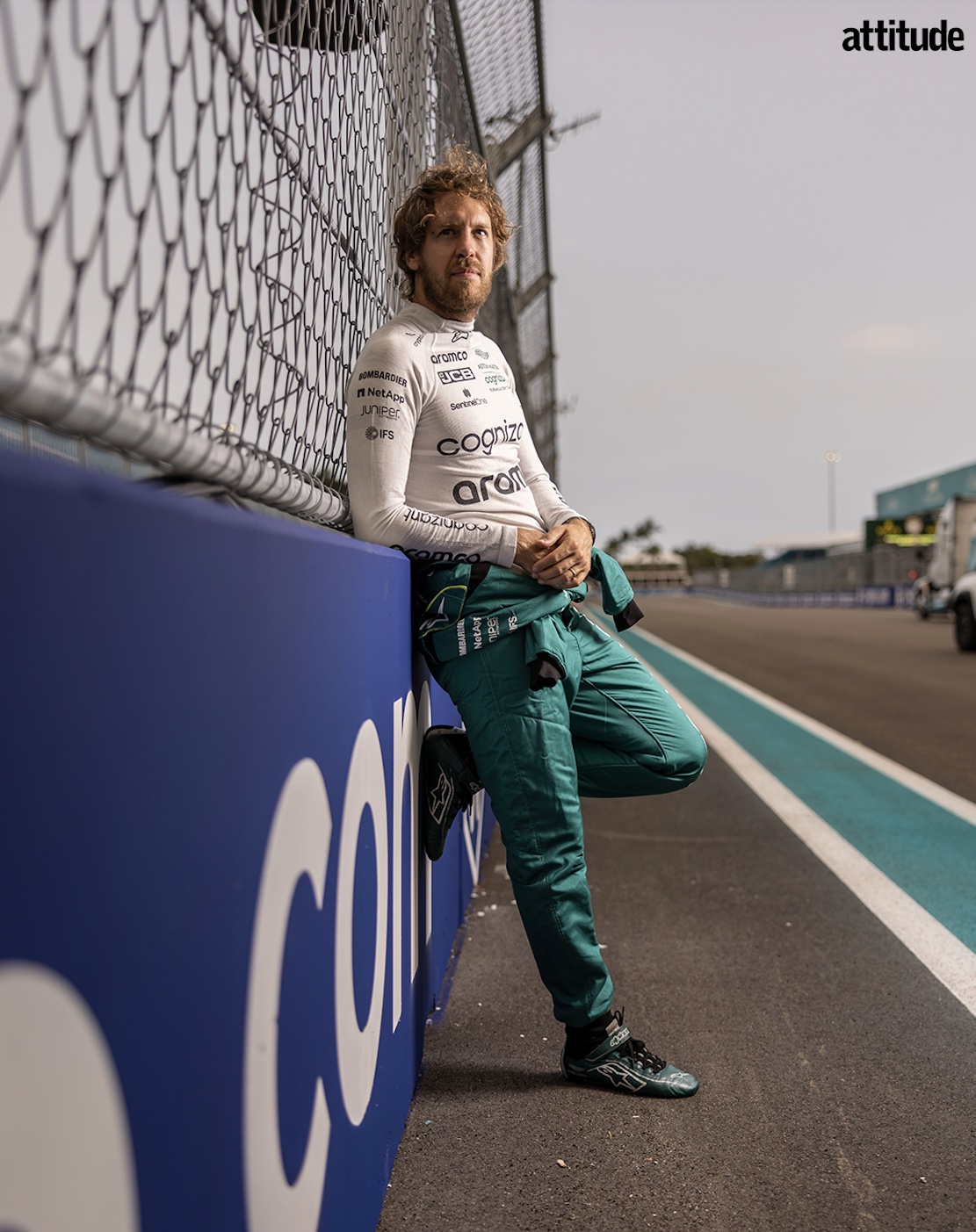
Photography: Glenn Dunbar
It’s one thing expressing your own values, but harder to maintain them when racing in countries where LGBTQ rights aren’t recognised, or — worse — are outlawed. You seem genuinely, and increasingly, uncomfortable with that dichotomy?
Formula One will put on 22 races in 20 countries this year. No country is perfect. My own country, Germany, is imperfect. The country of the team I race for, the UK, is imperfect. As far as LGBTQ rights are concerned, there are some countries that we visit that are much tougher than others — obviously. We could refuse to race in those countries — but what then? If we were not to race there, we’d be powerless to make any positive difference at all. But by racing in those countries and politely, but firmly, standing up for the values and principles that are important to us, I think we can have a positive impact. Values and principles can’t stop at borders.
Famously, you began wearing your now- legendary rainbow Converse trainers in Hungary last July, in response to that country outlawing LGBTQ education for anyone under 18. You had the rainbow on your helmet, too, and then wore a Pride T-shirt and matching face mask during the national anthem. Did you expect the level of response that followed?
I did it because I wanted to show that I didn’t, and wouldn’t, endorse the anti-LGBTQ legislation that had recently been enacted in Hungary. I didn’t do it to be popular. I don’t use social media myself, but I gather that my action was widely reported on Twitter, Instagram, and Facebook. I didn’t do it for that reason, as I say, but if LGBTQ people who had been upset by the legislation were encouraged to see that I’d stood up against it, obviously that’s pleasing to know.
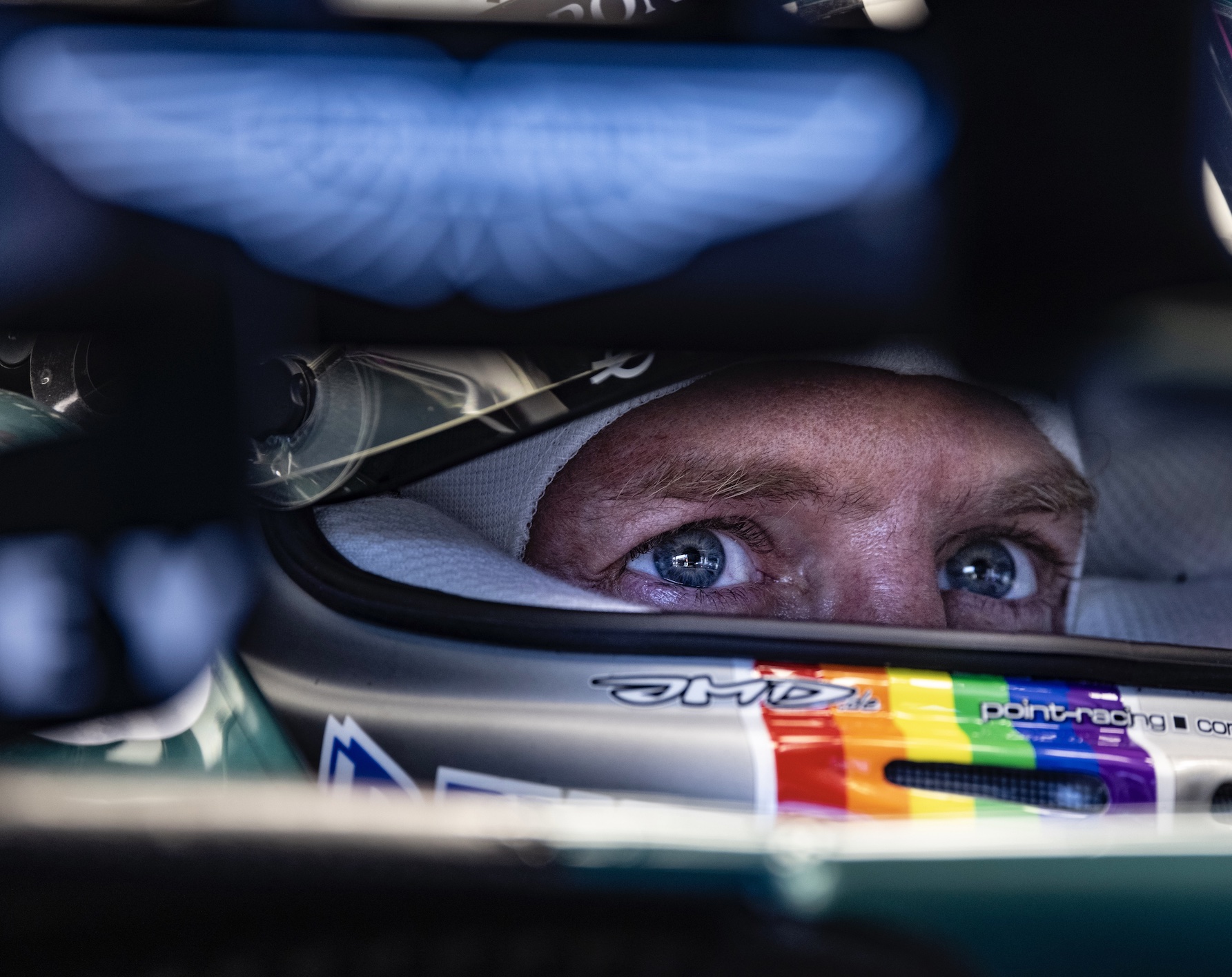
Image: Supplied
It was a really big deal for us. Such things resonate within the LGBTQ community in a way that you might not imagine. Were you aware of the strength of feeling and the outpouring of love from our direction?
I was — because people told me — and thank you for the love!
Interestingly, the first reaction from Formula One’s governing body, the FIA, was less than supportive and you were given an official reprimand — what did you make of that?
To be fair, I later learned that the reprimand had nothing whatsoever to do with the LGBTQ element. It was applied to me and a few other drivers, none of whom were wearing rainbow colours, because we didn’t take off our T-shirts for the Hungarian national anthem.
We’re supposed to stand for the national anthem in our race overalls, having removed the T-shirts that we wear over our race overalls to take the knee. But it was raining, and we were holding umbrellas, so some of us kept our T-shirts on over our race overalls.
I kept my shirt on intentionally, though…
Lewis Hamilton called the reprimand “bullshit” and you said “I’m happy if they disqualify me, I don’t care, I would do it again…” Who are you and what have you done with the Sebastian Vettel who won four world championships and was known as the world’s most serious man?
[Laughing] I’m still serious when I want to be, I promise you, and I take my racing extremely seriously. We aren’t yet doing as well this year on track as we would wish to be, but I’m very serious about working with the team to help improve our car.
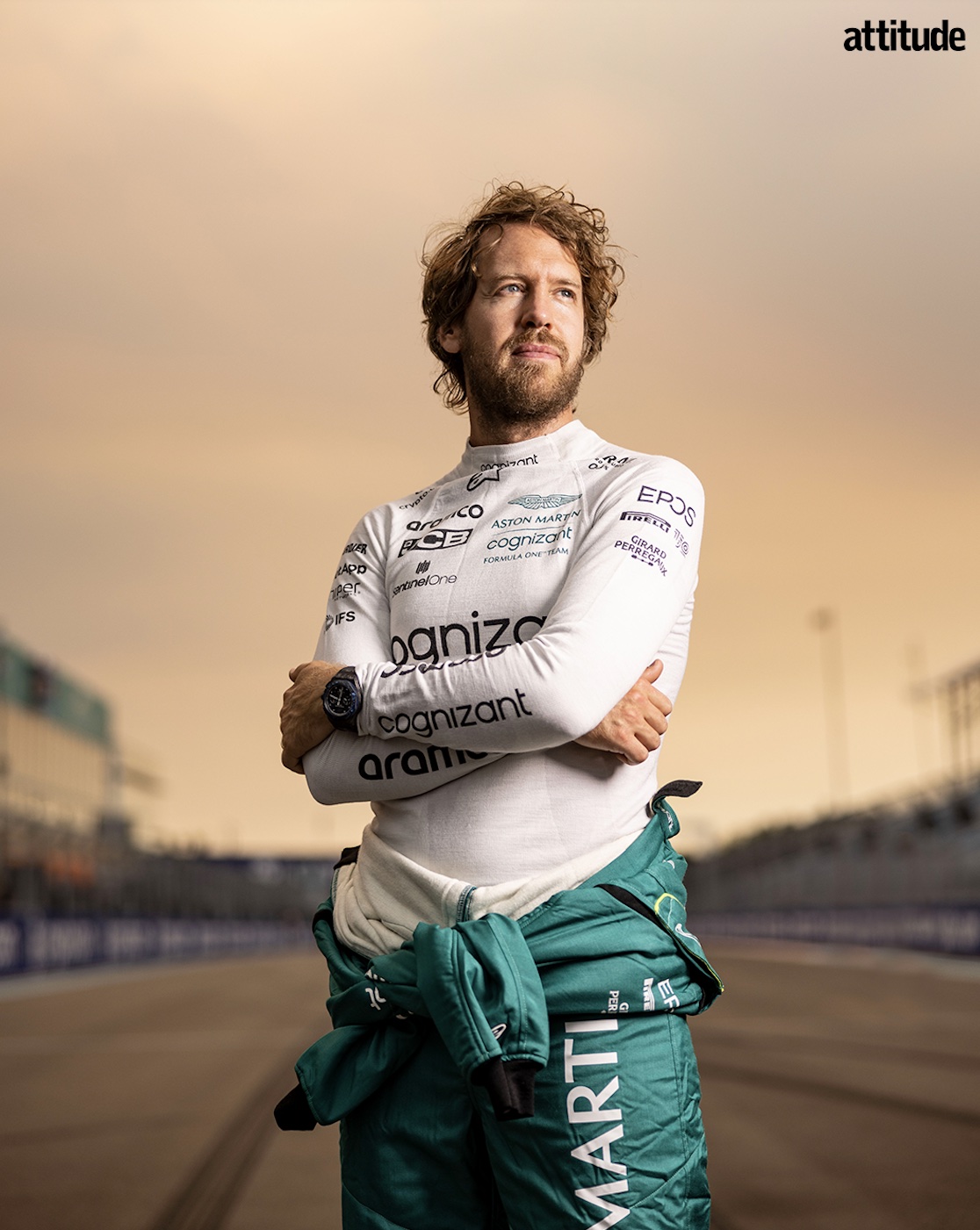
Photography: Glenn Dunbar
In all seriousness, then, the Red Bull Seb was about ticking off records, Ferrari Seb was holding out for the car they’ve only just built, but Aston Martin Seb seems different — carrying a racing life’s experience into an early-stage project and speaking his mind. It’s more fun for us — is it more fun for you?
I was 19 when I made my Formula One debut [at Indianapolis in 2007]. I’m 34 now. Did you change between the ages of 19 and 34? Yes, you did. We all do. I’m now married, with three children. I’m the same person but obviously my priorities have evolved. I’ve also become more confident. I don’t have to put up with things that I think aren’t right, and I won’t do so.
You were true to your word post-Hungary and dusted off the rainbow Converse trainers for last December’s Grand Prix in Saudi Arabia — a country where homosexuality isn’t just illegal, but punishable with chemical castration, life in prison and even death. Such things seem to be weighing heavier on you?
I’m totally against racism, sexism, ageism, homophobia and all forms of prejudice. I’m very concerned about the environment. I’ll always stand up for those values and principles. If I’m asked certain questions, I’ll answer them. If the platform of Formula One allows us to spread and share those values and principles more widely, I think that’s a very good thing.
Did you, for a moment, have any doubts — either then or previously in Hungary — about making such a statement?
None at all.
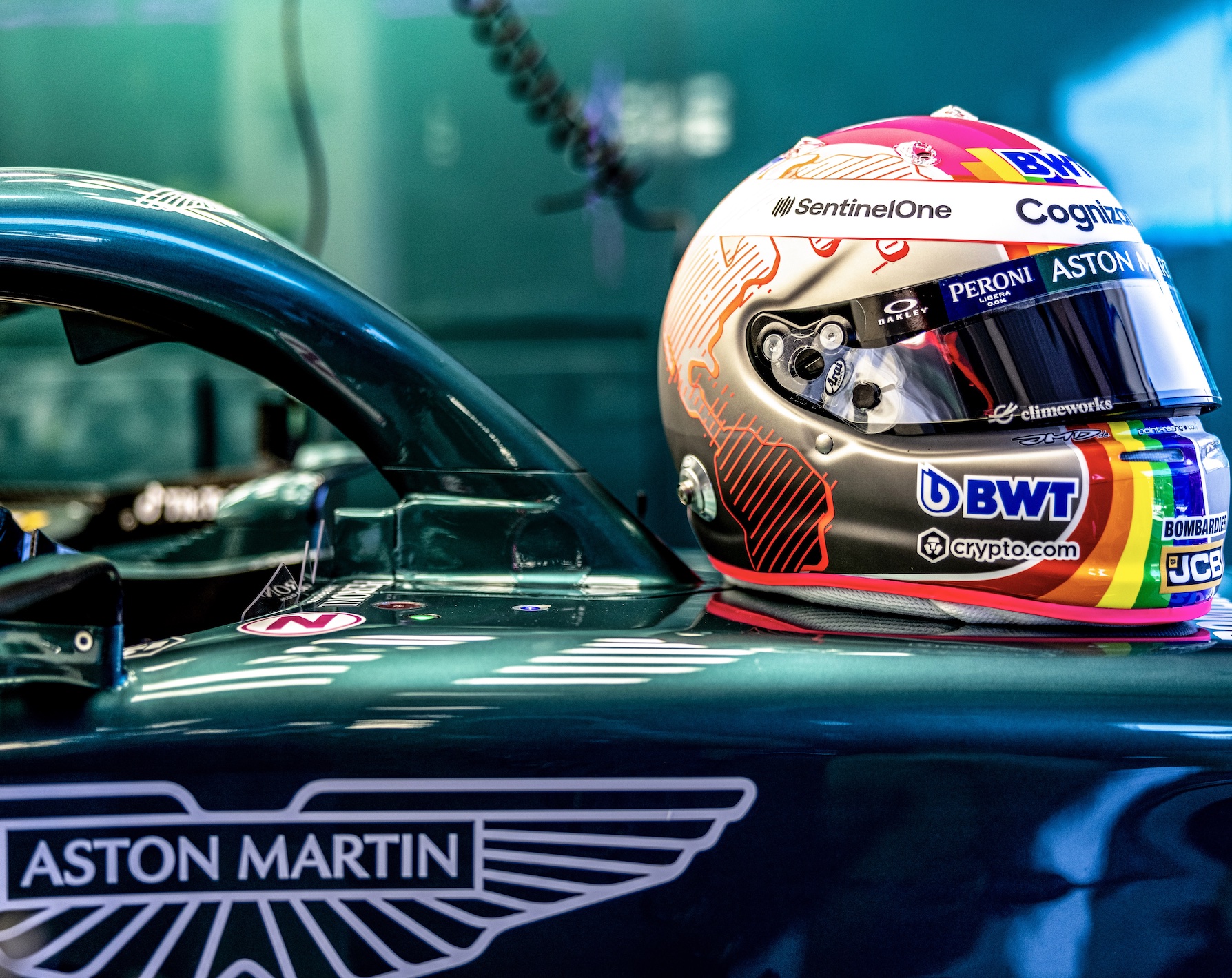
Image: Supplied
You went on record ahead of racing in Saudi Arabia as saying, “It’s time for professional athletes to raise their voices” and that you “cannot hide any more behind the curtain of performance and professional interest”. Are there places where sport simply shouldn’t go?
I feel it’s important that, if we go to certain places, we should do so determined to leave lasting positive impact. I feel that by going to those places we all have a certain responsibility.
As the first driver to speak out after Russia’s invasion of Ukraine, you were ahead of the curve on calling for the Russian Grand Prix to be cancelled. In fact, you said you shouldn’t even be asked to go. Does that entirely honourable desire to speak out point to a post- racing career? Guiding drivers or the sport, perhaps? Or even the political arena?
Honestly, I haven’t thought about it. I’m 34, not 44. I don’t know how long I’ll race in Formula One. I always feel that it’s the doing that makes the real difference. I can answer questions all day long, but it’s really my behaviours towards people and towards the planet that can make a difference and may perhaps inspire others.
From Attitude’s perspective, it’s straight allies who use their platform to highlight our community’s issues that have the real power to change our world. It moves our minority issues into the mainstream, and that’s where hearts and minds of the broader electorate are changed. Are you aware of the scale of the opportunity for good that you have?
I’m beginning to understand. Perhaps more Formula One fans have begun to think about diversity and inclusivity because of the actions of some of us — and, if they have, I’m pleased. So I’m happy and honoured to be your straight ally!
Have members of the LGBTQ community reached out to you?
Yes, they have, thanking me for speaking up and standing up — from inside the team and from outside the paddock, too. It’s very touching.
Are there lessons you have learned from your engagement with the LGBTQ community?
There are plenty — but the most important thing is that there’s still a lot to do, a lot to improve, and a lot of people to educate.
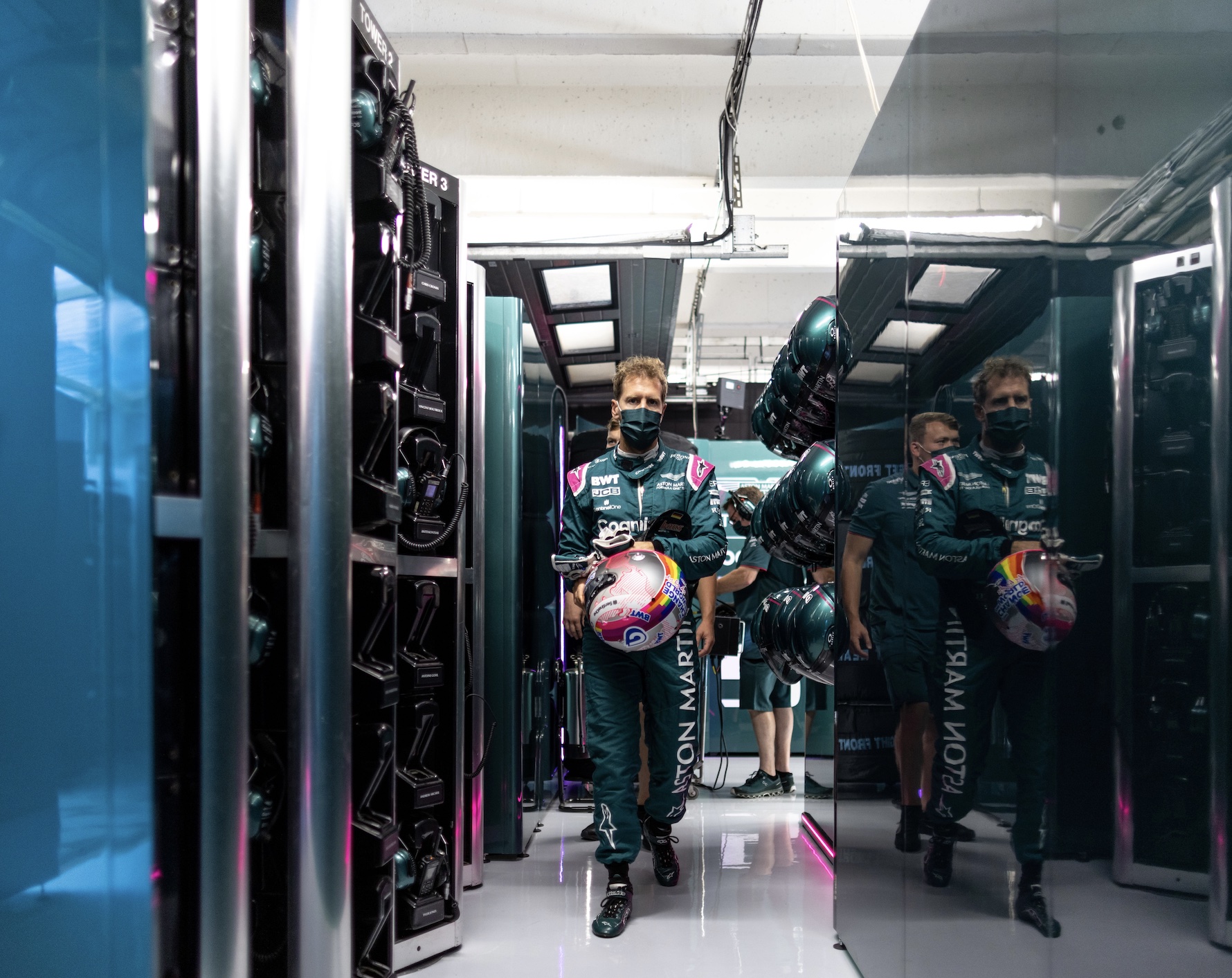
Image: Supplied
Have you had pushback from anyone?
Some Formula One people are quite conservative, but that’s surely the case in all big businesses? Formula One is a sport, yes, but it’s also a business. When I’ve spoken out in favour of LGBTQ equality and inclusivity, I may have raised a few eyebrows, but I haven’t had what you could call pushback. Maybe behind my back, but if I’m honest, I couldn’t care less.
Your Aston Martin team appear incredibly supportive of your willingness to engage with this subject matter off track. Is the team’s PR guru, Matt Bishop, an openly gay man working in Formula One and a founder of the Racing Pride organisation, excited to see you as a flag bearer for us?
I don’t think I excite Matt [laughs]. But seriously, we work well together, on regular racing-related comms and media issues as well as on LGBTQ-related matters. Matt is a racing man as well as an openly gay man.
What would your reaction be as a parent, if one of your children came out as a member of the LGBTQ community?
I feel my role as a parent is to love and support my children the best way I can. On top of that, I think there are so many things that children can teach us and show us. The way they see the world is so pure. Whatever they decide to do, or whomever they decide to love, I want to support them. Short answer: ideally no reaction other than unconditional support and love.
It’s more than two years since Germany became the fifth country in the world to ban so-called ‘conversion therapy’, the act of trying to ‘cure’ LGBTQ people. The UK government committed to doing the same more than four years ago. It recently U-turned on that commitment, then reinstated the proposal but excluded trans people. They have that wrong, don’t they?
Any form of suppression is wrong, full stop. Don’t we now live at a time in which we should know better? So many bad things happened in our past. So many people have suffered. There have been so many examples of how not to do it. We’ve learned so much. I feel the majority would agree.
Thank you, for your time, for your work and for using your profile as an LGBTQ ally in the places where it’s most difficult to do so. Not all heroes wear capes — for the next shoot maybe?
Capes are an awful fashion choice — I’ll stick with my rainbow trainers!
The Attitude July/August issue is out now.
